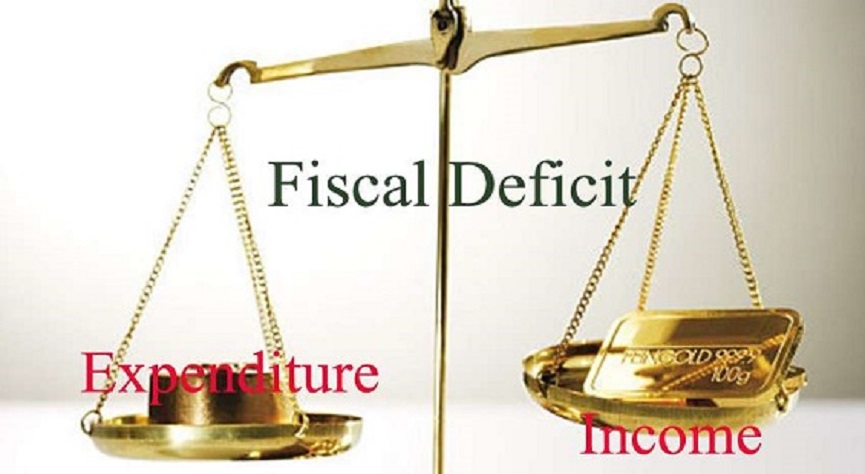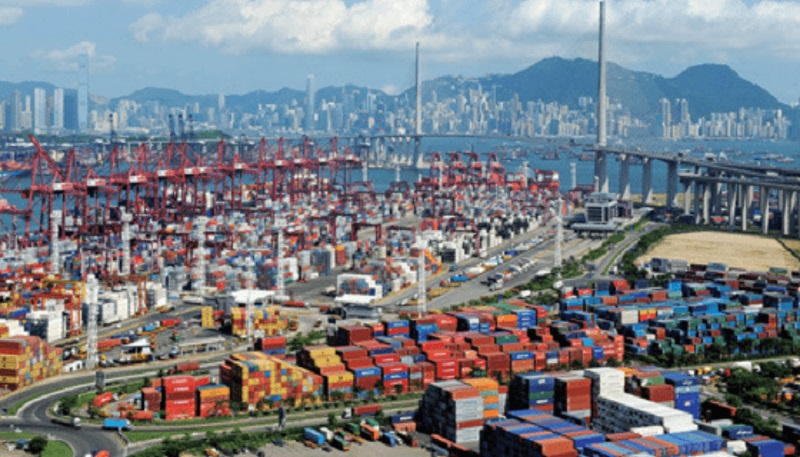Economy
Rewane Expresses Worry over Nigeria’s Fiscal Deficit of N8.92trn

By Dipo Olowookere
Renowned economist and Managing Director of Financial Derivatives Company Limited, Mr Bismarck Rewane, has expressed worry over the fiscal deficit of Nigeria.
Speaking on Monday at a webinar hosted by Stanbic IBTC Holdings Plc, a member of Standard Bank Group, the member of the Economic Advisory Council (EAC) of President Muhammadu Buhari said Nigeria’s expenditure currently stands at N19.63 trillion while its revenue stands at N10.71 trillion. This means Nigeria’s fiscal deficit stands at N8.92 trillion.
He further disclosed at the event themed 2022 Virtual Economic Outlook- Investing and planning in an election cycle that the fiscal deficit translates to an increasing level of poverty, inflation, unemployment and the number of out-of-school children.
Mr Rewane noted that the number of fully employed Nigerians had dipped by 54.41 per cent in the last five years and the working population grew by 18.45 per cent, while 50 per cent of Nigerians remain idle.
Highlighting Nigeria’s fiscal position in five years, he noted that while oil prices increased by 62.36 per cent; currency and balance of trade weakened by 239.76 per cent and 35.95 per cent respectively, with gross external reserves gaining 39.29 per cent.
According to him, sustained supply concerns have helped to shore up global oil prices above $80 per barrel while the Central Bank of Nigeria (CBN) has continued to step up its intervention programme in the forex market as the nation’s gross external reserves continue to dwindle. Also, he said, the naira has continued to witness increased pressure due to excess liquidity.
“The nation’s economy is expected to continue its rebound as witnessed in the last quarter of 2021 while oil prices are likely to remain high as major economies re-open fully and oil demand picks up.
“Furthermore, the advent of COVID-19 vaccines has continued to discount the impact of Omicron on oil demand while the effect of the Iran nuclear deal is expected to push up the nation’s oil supply to the global market. This is expected to provide more support to Nigeria’s earnings,” said Mr Bismarck.
“To boost the manufacturing sector, the Central Bank of Nigeria (CBN) is likely to intensify its forex intervention as it seeks to increase supply to manufacturers,
“Also, the CBN is expected to step up efforts towards exchange rate convergence, increase its intervention in the forex market while the postponement of the fuel subsidy removal will dampen the anticipated spike in inflation for the year as trade policies are expected to become less protectionist,” he added.
Also speaking at the event, the Executive Director of Corporate and Investment Banking at Stanbic IBTC Bank, Eric Fajemisin, noted that the lender, through its business advisory services, has continued to help its customers make good investment decisions and provide them with business financing.
On the part of the Executive Director of Business and Commercial Clients at Stanbic IBTC Bank, Remy Osuagwu, the organisation has continued to partner with the CBN in its various intervention programmes such as the Real Sector Fund, Anchor Borrowers Fund, and the Nigeria Incentive-Based Risk Sharing System for Agricultural Lending (NIRSAL), amongst others.
Commenting, the Chief Executive of Stanbic IBTC Pension Managers, Olumide Oyetan, said the company, through its investment management vehicle, has continued to provide avenues for investors to profitably invest their funds short and long term while ensuring the safety of invested funds.
The Executive Director of Client Solutions at Stanbic IBTC, Bunmi Dayo Olagunju, in her concluding remarks, stated that the economic ecosystem can improve during the election cycle if digital technologies can be leveraged effectively.
Earlier in his opening remarks, the Chief Executive of Stanbic IBTC Holdings Plc, Mr Demola Sogunle, thanked the customers for the confidence and trust reposed in the organisation through their patronage.
He assured Nigerians of valuable and exciting opportunities despite the likely headwinds as the nation prepares for its general elections.
The event was put together to reflect on the economic trends that shaped 2021 and give projections of what to expect in 2022. It also afforded participants the opportunity to learn directly from economic experts on the importance of planning and investment.
Economy
Customs Oil and Gas Free Trade Zone in Rivers Collects N53.98bn Revenue

By Adedapo Adesanya
The Nigeria Customs Service (NCS) Oil and Gas Free Trade Zone Command in Rivers State says it has achieved a record-breaking revenue collection of N53.98 billion between January and November 2024, exceeding its annual target by 2.3 per cent and nearly doubling the N26.80 billion generated in 2023.
This was disclosed by the Customs Area Controller, Oil and Gas Free Trade Zone, Onne, Comptroller Seriki Usman, during a press briefing at the command’s headquarters, where he attributed the success to strategic collaboration with stakeholders, operational efficiency, and a focus on regulatory compliance.
He said, “A notable achievement of the command was its record-breaking revenue collection of N53.98 billion. This figure represents a 2.3 per cent increase over our annual target for 2024 and a remarkable 98.6% rise compared to the N26.80 billion collected in 2023.
“Our record-breaking revenue underscores the importance of effective trade facilitation and regulatory compliance. This achievement reflects the commitment of our officers, the collaboration with stakeholders, and the critical role of the Oil and Gas Free Trade Zone in driving Nigeria’s economic growth,” he said.
He explained that the Command successfully facilitated the export of key products such as refined sugar, fertiliser, liquefied natural gas, LNG, and crude oil from major facilities, including Bundu Sugar Refinery, Notore Chemical PLC, and Bonny Island.
“The seamless management of imports and exports within the free trade zone has enhanced operations for licensed enterprises,” he noted.
Speaking on the significance of these achievements, Comptroller Usman emphasized the need to maintain the momentum.
“This accomplishment is not just about numbers but about fostering trade growth, innovation, and creating a conducive environment for businesses to thrive within the free trade zone.”
On regulatory compliance, Comptroller Usman reassured Nigerians of the Command’s commitment to ensuring adherence to international trade regulations while fostering economic progress.
“Our focus remains on enhancing service delivery, promoting ease of doing business, and driving revenue generation that supports the nation’s development goals,” he said.
The command emphasized that collaboration with stakeholders, particularly the Oil and Gas Free Trade Zone Authority, has been pivotal in achieving these milestones, and called for continued partnership to sustain trade growth and improve service delivery.
As the year comes to a close, the command has reiterated its resolve to solidify its role as a critical revenue driver and trade facilitator in Nigeria’s oil and gas sector.
Mr Usman said the performance reflects the command’s vital role in strengthening Nigeria’s non-oil revenue base and its determination to remain a key player in the country’s economic transformation efforts.
“We remain committed to sustaining our achievements, fostering trust among stakeholders, and contributing significantly to the nation’s economic growth,” Comptroller Usman concluded.
Economy
FAAC Disburses 1.727trn to FG, States Local Councils in December 2024

By Modupe Gbadeyanka
The federal government, the 36 states of the federation and the 774 local government areas have received N1.727 trillion from the Federal Accounts Allocation Committee (FAAC) for December 2024.
The funds were disbursed to the three tiers of government from the revenue generated by the nation in November 2024.
At the December meeting of FAAC held in Abuja, it was stated that the amount distributed comprised distributable statutory revenue of N455.354 billion, distributable Value Added Tax (VAT) revenue of N585.700 billion, Electronic Money Transfer Levy (EMTL) revenue of N15.046 billion and Exchange Difference revenue of N671.392 billion.
According to a statement signed on Friday by the Director of Press and Public Relations for FAAC, Mr Bawa Mokwa, the money generated last month was about N3.143 trillion, with N103.307 billion used for cost of collection and N1.312 trillion for transfers, interventions and refunds.
It was disclosed that gross statutory revenue of N1.827 trillion was received compared with the N1.336 trillion recorded a month earlier.
The statement said gross revenue of N628.972 billion was available from VAT versus N668.291 billion in the preceding month.
The organisation stated that last month, oil and gas royalty and CET levies recorded significant increases, while excise duty, VAT, import duty, Petroleum Profit Tax (PPT), Companies Income Tax (CIT) and EMTL decreased considerably.
As for the sharing, FAAC disclosed that from the N1.727 trillion, the central government got N581.856 billion, the states received N549.792 billion, the councils took N402.553 billion, while the benefiting states got N193.291 billion as 13 per cent derivation revenue.
From the N585.700 billion VAT earnings, the national government got N87.855 billion, the states received N292.850 billion and the local councils were given N204.995 billion.
Also, from the N455.354 billion distributable statutory revenue, the federal government was given N175.690 billion, the states got N89.113 billion, the local governments had N68.702 billion, and the benefiting states received N121.849 billion as 13 per cent derivation revenue.
In addition, from the N15.046 billion EMTL revenue, FAAC shared N2.257 billion to the federal government, disbursed N7.523 billion to the states and transferred N5.266 billion to the local councils.
Further, from the N671.392 billion Exchange Difference earnings, it gave central government N316.054 billion, the states N160.306 billion, the local government areas N123.590 billion, and the oil-producing states N71.442 billion as 13 per cent derivation revenue.
Economy
Okitipupa Plc, Two Others Lift Unlisted Securities Market by 0.65%

By Adedapo Adesanya
The NASD Over-the-Counter (OTC) Securities Exchange recorded a 0.65 per cent gain on Friday, December 13, boosted by three equities admitted on the trading platform.
On the last trading session of the week, Okitipupa Plc appreciated by N2.70 to settle at N29.74 per share versus Thursday’s closing price of N27.04 per share, FrieslandCampina Wamco Nigeria Plc added N2.49 to end the session at N42.85 per unit compared with the previous day’s N40.36 per unit, and Afriland Properties Plc gained 50 Kobo to close at N16.30 per share, in contrast to the preceding session’s N15.80 per share.
Consequently, the market capitalisation added N6.89 billion to settle at N1.062 trillion compared with the preceding day’s N1.055 trillion and the NASD Unlisted Security Index (NSI) gained 19.66 points to wrap the session at 3,032.16 points compared with 3,012.50 points recorded in the previous session.
Yesterday, the volume of securities traded by investors increased by 171.6 per cent to 1.2 million units from the 447,905 units recorded a day earlier, but the value of shares traded by the market participants declined by 19.3 per cent to N2.4 million from the N3.02 million achieved a day earlier, and the number of deals went down by 14.3 per cent to 18 deals from 21 deals.
At the close of business, Geo-Fluids Plc was the most active stock by volume on a year-to-date basis with a turnover of 1.7 billion units worth N3.9 billion, followed by Okitipupa Plc with the sale of 752.2 million units valued at N7.8 billion, and Afriland Properties Plc with 297.3 million units sold for N5.3 million.
In the same vein, Aradel Holdings Plc remained the most active stock by value on a year-to-date basis with the sale of 108.7 million units for N89.2 billion, trailed by Okitipupa Plc with 752.2 million units valued at N7.8 billion, and Afriland Properties Plc with a turnover of 297.3 million units worth N5.3 billion.
-

 Feature/OPED5 years ago
Feature/OPED5 years agoDavos was Different this year
-
Travel/Tourism8 years ago
Lagos Seals Western Lodge Hotel In Ikorodu
-

 Showbiz2 years ago
Showbiz2 years agoEstranged Lover Releases Videos of Empress Njamah Bathing
-

 Banking6 years ago
Banking6 years agoSort Codes of GTBank Branches in Nigeria
-

 Economy2 years ago
Economy2 years agoSubsidy Removal: CNG at N130 Per Litre Cheaper Than Petrol—IPMAN
-

 Banking2 years ago
Banking2 years agoFirst Bank Announces Planned Downtime
-

 Sports2 years ago
Sports2 years agoHighest Paid Nigerian Footballer – How Much Do Nigerian Footballers Earn
-

 Technology4 years ago
Technology4 years agoHow To Link Your MTN, Airtel, Glo, 9mobile Lines to NIN























